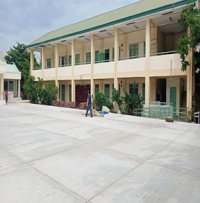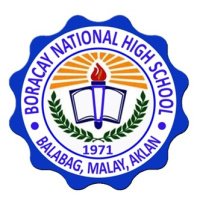Difference between revisions of "Boracay National High School"
| Line 142: | Line 142: | ||
''' References: ''' | ''' References: ''' | ||
| − | :::::::::: Interview with Key Informants | + | :::::::::: '''Interview with Key Informants''' |
| − | :::::::::: Biography of Ms. Leonisa S. Tumaob | + | :::::::::: '''Biography of Ms. Leonisa S. Tumaob''' |
''' Name of Profiler/Mapper: ''' | ''' Name of Profiler/Mapper: ''' | ||
Revision as of 05:36, 3 November 2023
Category: Significant Cultural Institution
District of Malay
Contents
Background Information:
Name of institution: BORACAY NATIONAL HIGH SCHOOL
Municipality/City: MALAY
Province: AKLAN
Location/Address: BALABAG, MALAY, AKLAN
Type of Cultural Institution:
Boracay National High School is an educational institution that aims to establish globally competitive individuals who are equipped with life-long skills and can compete within the community and the world.
Narrative Description:
Boracay National High School, which originated as Boracay Barangay High School, was established in 1971. The establishment of the said Barangay High School was due to the initiative of the three barangay captains of the three barangays comprising the island of Boracay, namely: Hon. Roque Salazar (Balabag), Hon. Antonio Salvador (Yapak), and Hon. Eutiquio Bandiola (Manocmanoc): During this time, students of the island who wished to pursue secondary education would have to enroll in Kabangrusan (Union, Nabas, Aklan), a barangay situated in an adjacent town of Malay because the island only offers elementary school; thus, the said barangay captains came up with the decision to put up its own high school on the island. It was named Boracay Barangay High School, which started with the first and second years with Ma’am Baby Azucena as the first and only teacher who took turns in teaching both the two-year levels and Mr. Antonio Cahilig as the Officer-in-Charge. After two years, a third year was added, followed by the completion of a fourth year a year later.
The school was financed on the initiative of parents’ contributions, including the teacher’s monthly salary. The first classroom was built through the Bayanihan effort of the local residents, who constructed a makeshift classroom made of amakan, pawod, and sulirap as the roof inside the elementary premise. However, as the population of students grew, the need for additional classroom space became a problem. According to Mr. Glenn Y. Sacapaṅo, one of the first batch of graduates, some students were transferred to Mr. Marcos Salido’s house, which was used as a temporary classroom situated behind the Barrio Plaza of Balabag due to a lack of classrooms until additional rooms were constructed. The first batch graduated in 1976 with fewer than twenty graduates.
In 1978, Ms. Leonisa S. Tumaob, Master Teacher I, at the same time Elementary Head Teacher III in 1980, was assigned as Assistant Principal in Balabag Barangay High School until she became a full-fledged Principal in 1994. In 1985, the school established the so-called Department of Education, Culture, and Sports Hostel, which served as a practice house for technical vocational courses, especially home economics. This also served as accommodation for teachers from other provinces who came to visit the island. The hostel was abolished in 2013.
A Secondary Education Development Programme facility was constructed between 1982 and 1983 since the school was overrun with students not only from the two neighboring barangays of Yapak and Manocmanoc but also from the nearby island of Hambil (Carabao Island). The construction was finished in 1989 with eleven rooms, but it was demolished in 2019 to be replaced by a new one. In 2010, two additional rooms were constructed, known as the Lapus Building. In 2016, the Junior and Senior High School Buildings were constructed, consisting of six rooms for each building for a total of twelve rooms. In 2020, another round of construction of new buildings took place. The Modified Standard Department of Public Works Highway and Department of Education School structure added seventeen extra rooms, while the Local Government Unit Special Education Fund funded another structure with three rooms.
Boracay Barangay High School was renamed Boracay National High School in 1988 as per the provisions of Republic Act No. 6655, An Act Establishing and providing for a Free Public Secondary Education, among many others. During the late President Corazon C. Aquino's presidency, the act introduced free public secondary education for all qualifying residents.
The following are the principals and school heads who have served Boracay National High School since its establishment up to the present: Mr. Antonio Cahilig, Officer-in-Charge (1971–1976); Leonisa S. Tumaob, Asst. Principal/Officer-in-Charge (1977–1993), Principal (1994–2007); Almarie T. Vallejo, Principal (July 15, 2008–June 13, 2013); Jose Niro R. Nillasca, Principal (June 17, 2013–March 12, 2015); Victor E. Supetran, Officer-in-Charge;(March 15, 2015- June 16, 2016); Eliseo B. Casidsid, Principal II (June 16, 2016–present).
Mr. Charlemagne Yabut wrote the Boracay National High School Hymn in February 2007.
Boracay National High School, the major educational institution in the heart of Boracay Island, is currently aiming to develop globally competitive students who are equipped with life-long skills and can compete in the community and throughout the world.
Description of Significant Milestones:
Boracay National High School is a competitive school located on the island of Boracay in the District of Malay, Province of Aklan, Region 6, Western Visayas. Students are encouraged to participate in events and competitions both on and off campus, and they are molded to be globally competitive.
Mr. Eliseo B. Casidsid, principal of BNHS, and Mr. Eiichi Sakata, principal of Joso Gakuin, a school in Japan, signed a Memorandum of Agreement on May 4, 2023, establishing an online collaborative cultural exchange with selected Junior High School students between the two institutions. Anna Ria G. Mosquera, Araling Panlipunan School, and District Coordinator, assisted by Mc John F. Gelito, Learning Resource Management and Development System School and District Coordinator, are in charge of the program. For cultural exchange students, the school also provides a tutorial lesson on the Japanese language and culture with a Japanese volunteer, Mr. Kiyo, at least once a week.
Stories and Narratives:
Boracay National High School has continually provided an outstanding education to children on the island for the past fifty-two years and is constantly expanding.
The school's determination was tested and proven when the island was closed for six months, which ultimately turned into a year, and the recent pandemic substantially affected the kids' economic condition. Despite these challenges, the school remained resilient and continued to grow in population. From fewer than twenty pupils and two light-material classrooms in 1971, the school today has more than a thousand students and sixty-seven teaching and non-teaching staff members led by School Principal II, Mr. Eliseo B. Casidsid.
Significance:
Aesthetic:
The Boracay National High School has an amazing viewpoint of one of the island's finest forestlands seeing as it is close to a peak where Mount Luho is located. The Department of Environment and Natural Resources (DENR) recognized the lagoon on the mountain's surface as Wetland No. 3. A wide range of plants, including flowers, herbs, and vegetables, surround the school, balancing the beauty of nature with modern classroom design.
The Boracay National High School Dance Troupe was founded in 2014 to actively advocate and promote local culture through dance performances, and it was recognized by the Cultural Center of the Philippines, with Mr. Mc John F. Gelito as its founder and choreographer. The Boracay National High School Chorale, on the other hand, is made up of student choirs that participate not only in school activities but also in church activities and other social and cultural gatherings, with Mr. Bobby N. Dalida as the founder and choirmaster.
Economic:
The school offered Technical Vocational Livelihood Tracks based on the needs of the locality, being a tourist island, such as Tour Guiding, Pastry Making, and Food and Beverages. Such tracks helped the students earn extra money to support their needs by selling goods like bread, cakes, and other pastries inside and outside the school campus. Some of the graduates were absorbed and got hired by resorts and restaurants that they served during practicum because of their exemplary performance.
Political:
The school received funds from the LGU-SEF Fund. In fact, the Local Government Unit gave one of the school buildings, which comprised three rooms. During elections, the teachers serve on the Commission on Elections.
Spiritual:
The Boracay National High School Chorale Group was formed by the school and is led by Mr. Bobby N. Dalida. The chorale not only performs at school events, but it also serves the church every Sunday and participates in other church-related activities.
Assessment of the Institution:
A. Condition/Status of the Institution
Boracay National High School is constantly aligning its efforts in order to translate its mission and vision into tangible realities; it actively supports cultural programs and other culturally related programs performed by the campus chorale and dance troupes, and it also highlights the talent and skills performed by IPs students as part of its advocacy for the preservation of cultural heritage.
B. Constrains/ Threats/ Issues/ Challenges:
The school is in the heart of a sinkhole. This is the basis for opposing the proposed additional two-story structure inside the region where it is located. During extreme rains, some places are also at risk for flooding.
C. Measures and Description of Safeguarding Measures Taken:
Guided by its mission and vision, Boracay National High School is constantly aligning its efforts to translate its mission and vision into tangible realities. With this, the school is working with its stakeholders in the planning and implementation of the various Priority Programs, Activities, and Projects (PAPs) of the school.
Logo:
| 1971 | - the founding year |
| Torch | - lighting of the path |
| Book | - knowledge |
| Laurel | - a symbol of triumph |
References:
Supporting Documentation:
[ / ] Print, write-ups
[ / ] Audio/video recording
[ / ] Photographs and sketches
[ ] Others __________________________
Key Informants:
- EXALTACION SALAZAR
- Retired Public School Elementary Teacher
- Balabag Elementary School
- Balabag, Malay, Aklan
- HON. GLENN Y. SACAPANO
- 1st Batch of Boracay Barangay High School Graduate
- Balabag, Malay, Aklan
- ELISEO B. CASIDSID
- Principal II
- Boracay National High School
References:
- Interview with Key Informants
- Biography of Ms. Leonisa S. Tumaob
Name of Profiler/Mapper:
- ANNA RIA G. MOSQUERA
- Teacher 1
- Boracay National High School
- Araling Panlipunan Secondary District Coordinator
- District of Malay
Name of Language Expert:
- LIEZEL R. TAPAR
- Teacher 1
- Lezo Integrated School
Name of Lay-out Artist:
- JOSEPH STEPHEN L. RESICO
- Teacher II
- New Washington National Comprehensive High School
Name of Evaluators:
- MR. DENNIS E. BONTOGON
- Master Teacher III
- Kalibo Pilot Elementary School
- JOSEPHINE P. VICENTE
- Teacher III
- Regional Science High School
Wiki Editor:
- MR. JOHN ELIAS F. ARAOJO
- Teacher I
- Manocmanoc National High School
Date Profiled:
- June 29, 2023
Approved:
- RUBY AGNES B. ESTRADA, PhD.
- Education Program Supervisor - Araling Panlipunan


